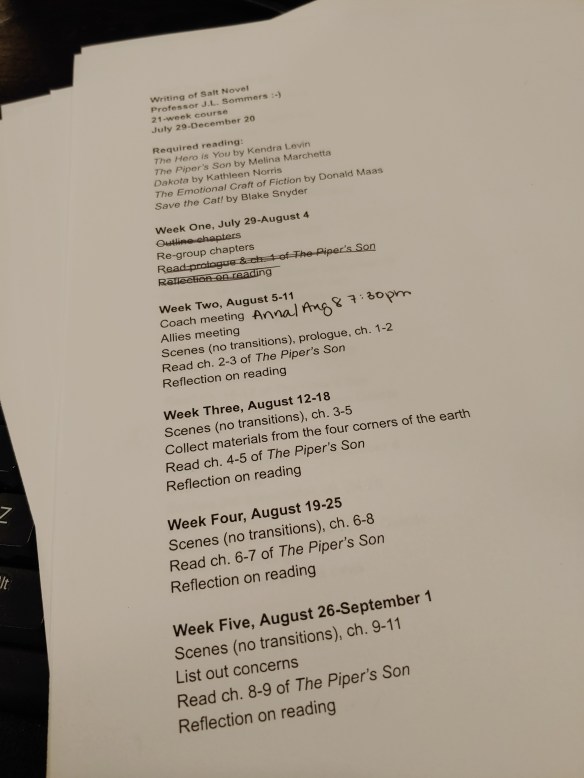 Honestly, I’m taking this quarantine day by day (sometimes minute by minute), and I’m respecting my body and anxiety when they tells me they just want to be still or watch Netflix or take a second nap.
Honestly, I’m taking this quarantine day by day (sometimes minute by minute), and I’m respecting my body and anxiety when they tells me they just want to be still or watch Netflix or take a second nap.
Motivation comes and goes. I am using this as a guide. Week one is just ending, and I only revised 15 of the 25 pages I’d hoped for. It’s okay. It’s all okay. I’m grateful for any steps I take; I’m [trying to be] gracious about any steps I can’t.
Posting this partially for accountability– but also just in case it helps anyone else.
Syllabus for Writing Salt Novel
14 Weeks
“[T]his ‘work’ had been driven by the question, What’s wrong with me? The question her Mentor replaced this with was, Which parts of myself need to be loved today?”
The Hero is You, Kendra Levin
Required Reading
All That Is Made: a Guide to Faith and the Creative Life from Alabaster Co.
The Gifts of Imperfection by Brene Brown
Keep Going by Austin Kleon
March 30-April 5
Reading:
Part I, Ch. 1 All That Is Made
Pg. 1-22 Gifts of Imperfection
Step 1 of Keep Going
Revise:
Pg. 1-25
Related “Interview” Chapter Breaks
April 6-April 12
Reading:
Part I, Ch. 2-3 All That Is Made
Pg. 23-48 Gifts of Imperfection
Revise:
Pg. 26-50
Related “Interview” Chapter Breaks
April 13-April 19
Reading:
Part I, Ch. 4 All That Is Made
Guidepost #1 Gifts of Imperfection
Step 2 of Keep Going
Revise:
Pg. 51-75
Related “Interview” Chapter Breaks
Conversation with a Creative Ally
April 20-April 26
Reading:
Part I, Ch. 5-6 All That Is Made
Guidepost #2 Gifts of Imperfection
Revise:
Pg. 76-100
Related “Interview” Chapter Breaks
April 27-May 3
Reading:
Part I, Ch. 7 All That Is Made
Guidepost #3 Gifts of Imperfection
Step 3 of Keep Going
Revise:
Pg. 101-125
Related “Interview” Chapter Breaks
May 4-May 10
Reading:
Part I, Ch. 8-9 All That Is Made
Guidepost #4 Gifts of Imperfection
Step 4 of Keep Going
No revisions this week/Catch-up
Conversation with a Creative Mentor
May 11-May 17
Reading:
Part II, Ch. 1 All That Is Made
Guidepost #5 Gifts of Imperfection
Step 5 of Keep Going
Revise:
Pg. 126-150
Related “Interview” Chapter Breaks
May 18-May 24
Reading:
Part II, Ch. 2-3 All That Is Made
Guidepost #6 Gifts of Imperfection
Step 6 of Keep Going
Revise:
Pg. 151-175
Related “Interview” Chapter Breaks
May 25-May 31
Reading:
Part II, Ch. 4 All That Is Made
Guidepost #7 Gifts of Imperfection
Step 7 of Keep Going
Revise:
Pg. 176-200
Related “Interview” Chapter Breaks
Conversation with a Creative Ally
June 1-June 7
Reading:
Part II, Ch. 5-6 All That Is Made
Guidepost #8 Gifts of Imperfection
Step 8 of Keep Going
Revise:
Pg. 201-225
Related “Interview” Chapter Breaks
June 8-June 14
Reading:
Part III, Ch. 1 All That Is Made
Guidepost #9 Gifts of Imperfection
Step 9 of Keep Going
Revise:
Pg. 226-250
Related “Interview” Chapter Breaks
June 15-June 21
Reading:
Part III, Ch. 2 All That Is Made
Guidepost #10 Gifts of Imperfection
Step 10 of Keep Going
No revisions this week/Catch-up
Conversation with a Creative Mentor
June 22-June 28
Reading:
Part III, Ch. 3-4 All That Is Made
Revise:
Pg. 251-275
Related “Interview” Chapter Breaks
June 29-July 5
Reading:
Part III, Ch. 5-6 All That Is Made
Revise:
Pg. 276-300
Related “Interview” Chapter Breaks
Celebrate Independence Day!















 My blog has definitely helped with marketing– and to connect with my audience who find my blog after reading my book. The blog is a marketing strategy, a creative outlet, a platform to share about issues I care deeply about (mental illness, faith, literature, underdogs), and a way to be real with readers. It’s a good way for me to keep writing and “publishing” material that while I’m working on a longer piece behind the scenes, if that makes any sense. Sometimes I think of my blog as writing “practice.”
My blog has definitely helped with marketing– and to connect with my audience who find my blog after reading my book. The blog is a marketing strategy, a creative outlet, a platform to share about issues I care deeply about (mental illness, faith, literature, underdogs), and a way to be real with readers. It’s a good way for me to keep writing and “publishing” material that while I’m working on a longer piece behind the scenes, if that makes any sense. Sometimes I think of my blog as writing “practice.” So, you’ve sent out your query letters, signed with a literary agent, and secured a book deal. Your dream is in writing, in the language of a contract. Now what?
So, you’ve sent out your query letters, signed with a literary agent, and secured a book deal. Your dream is in writing, in the language of a contract. Now what? I was later shown eight choices and asked for my opinion again. They ended up going with my second choice (although by the end it was my absolute #1 favorite!), and let my thoughts guide multiple changes.
I was later shown eight choices and asked for my opinion again. They ended up going with my second choice (although by the end it was my absolute #1 favorite!), and let my thoughts guide multiple changes.
